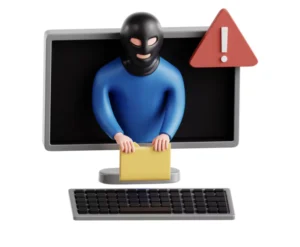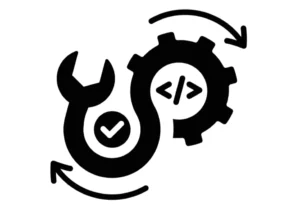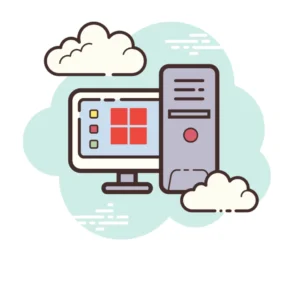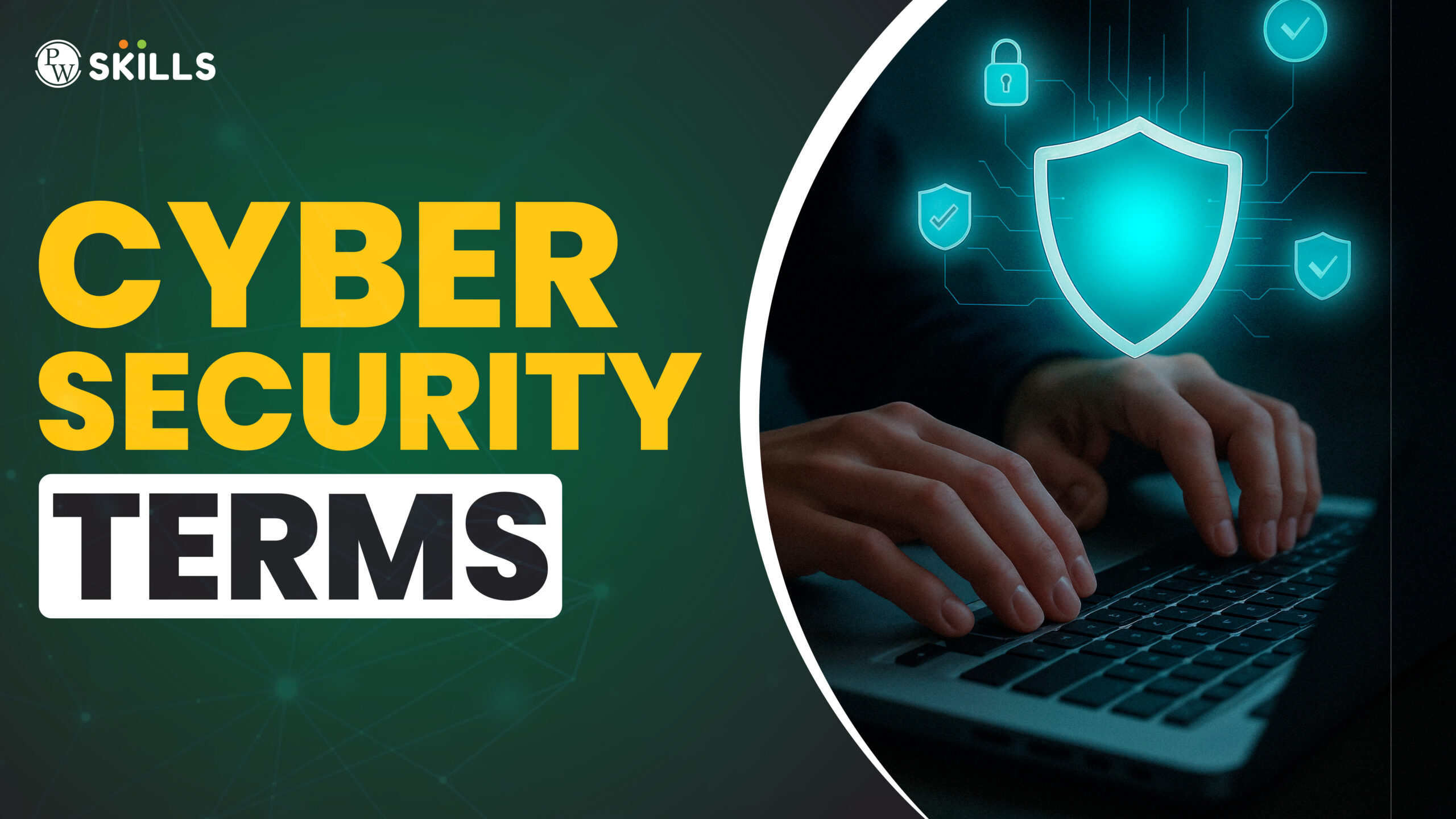Cyber threats’ types that exist today include anything from phishing emails to data leaks; thus, understanding cybersecurity now is no longer just for tech experts. Whether you’re a student who is merely entering the digital world or a professional who encounters daily risks online, this guide will provide you with a list of must-know cybersecurity terms, free of tech jargon: just plain English. Ready to upgrade that digital IQ? Let us break down the 35+ cybersecurity terms you should have in your toolkit.

Cyber Security Terms: Getting Started
Here we go with some common cybersecurity terms. These are the basic ABCs of digital safety.
- Cybersecurity – The protection of the systems, networks, and programs from all kinds of attacks, be it digital or virtual.
- Firewall- Barrier that prevents unwanted traffic from entering your device or network.
- Malware- These include viruses, trojans, and worms, the types of malware that harm and corrode a system.
- Phishing- Messages or emails pretending to be the real one, thus tricking you into divulging sensitive information.
- VPN- Virtual Private Network keeps your internet connection secured and private.
Familiarity with those cybersecurity terms is just like understanding traffic lights before driving.
Cyber Security Terms for Threats and Attacks
Here comes the treasure of threats bubbling right under one nose. It consists of the cyber security terms that implicate one concerning the attack:
- Ransomware – A malware program that locks an individual’s data and demands ransom.
- DDoS (Distributed Denial of Service) – Attackers flood a server to crash it.
- Brute Force Attack – Trying every password combination until one works.
- Zero Day Exploit – Attacks occurring before developers can patch a software bug.
- SQL Injection – Sequences of inserting malicious code into a website’s database using submission forms.
Being conversant in these basic cybersecurity terms keeps one alert and makes him safer in cyberspace.
Cyber Security Terms for Protection Tools
It’s time to meet your defenders. The following cybersecurity terms describe the tools that protect you.
- Antivirus Software – Scanning and removing threats from your system.
- Two-Factor Authentication (2FA) – An additional layer on logins, like OTPs or biometrics.
- Encryption – Transform data into a format that cannot be read by unauthorized persons.
- Password Manager – It is a tool that helps you securely save and manage your passwords.
- Patch – A software within an upgrade that plugs bugs or holes in security.
With these tools, threats act as storms: they are your umbrellas.

Cyber Security Terms Every Working Professional Should Know
These common cybersecurity terms come up so often in modern workplaces, no matter whether you are in marketing, HR, finance, or IT.
- Insider Threat – Risks that come from employees or internal users.
- Data Breach-Sensitive data is being accessed without permission.
- Compliance-Obligation of a legal standard or an industry standard (like GDPR, HIPAA).
- The Access Control-Refers to the ability to limit who can view or edit certain data.
- Risk Assessment-Identifies cyber risks before they strike.
Knowing these cybersecurity terms will help every employee work more safely and protect the organization.
Cyber Security Terms for Students and Beginners
These are the very basic cybersecurity terms that will be understandable for everyone:
- IP Address – Like a digital home address for your device.
- Cookies – They’re tiny files that websites deposit in your browser to track your activity.
- Botnet – A network of infected devices controlled by a hacker.
- Spoofing- Getting someone to believe that you are one of their contacts (e.g., fake caller ID).
- Rootkit- Malware hides deep within the system to avoid detection.
Knowledge of all the terms about cybersecurity is the first step in becoming the digitally aware individual.
Advanced Cyber Security Terms
Such cybersecurity terms may sound very high-level, yet they are totally understandable.
- SOC (Security Operations Center) – A team that monitors threats 24/7.
- SIEM (Security Info & Event Management) – Tool to analyze security alerts.
- Penetration Testing – Ethical hacking to find system weaknesses.
- Honey Pot – A trap set up to lure and study hackers.
- Ethical Hacker – A security expert who hacks legally to improve security.
Those cyber security terms are well-discussed for students who would want to build a career in cybersecurity.

Cyber Security Terms Associated with Internet Privacy and Trends
In an increasingly connected world, we understand that your online footprint matters; and these cyber security terms can protect you:
- Dark Web – A part of the internet not indexed by search engines.
- Digital Footprint – A trail of data that shows you have been online.
- Social Engineering – An attempt to sway a person into releasing his confidential data.
- Cyber Hygiene – Safe online habits such as keeping up strong passwords.
- Incident Response: The collection of methods upon which an organization acts after a cyberattack has occurred.
And here is a bonus:
- Zero Trust Model – Trust nothing; check everything. All users and devices must be checked before granting access.
Why These Cyber Security Terms Matter More Than Ever
Cybersecurity terms are mastering your language of security as students build up their careers and professionals increasingly rely on digital platforms. From securing your email to protecting company data, knowing the right words helps you act quickly and smartly.
Really, not just important, but empowering. One is no longer in the dark when someone says, “Your data might’ve been compromised.” You know what to ask, where to look, and what action to take.

Cyber Security Terms You Need to Know
You do not have to be a techno-whiz to have an idea of what cybersecurity involves. Having a knowledge of these terms in cybersecurity can go pretty far in helping you keep not only your data safe but also that of your devices and even your workplace.
Want to go beyond terms and learn how to defend, protect, and prevent cyber threats in real time?
Also Read:
- Online Cybersecurity Internship by Tata: Apply now for your Free Certificate
- 20 Emerging Cybersecurity Trends to Watch Out in 2025
- Cyber Security Jobs: Top 15 High-Demand Roles in India for 2025
- Explore Cyber Security Tutorial: Start Your Career in Cyber Safety (2025 Insights)
Start Your Cybersecurity Career with PW Skills
Ready to step into the cyber defense world? The PW Skills Cybersecurity Course is designed for students, beginners, and working professionals to provide hands-on labs, expert guidance, and assured interview support.
Start today with learning real-world skills and build a future-proof career in one of the fastest-growing tech fields.
Knowing just the basic cybersecurity words can save you from being phished, generate stronger passwords, and guard against sensitive company data from being leaked, whether you're in IT or not. Tear them into groups like threats, tools, and workplace terms. Try flashcards or link them to daily life experiences like spammy emails or Netflix logins. Yes, this completes your foundation. Mix this with hands-on practice using free tools or courses. A hacker is one who illegally breaks into systems. An ethical hacker similarly uses his skills but by permission to find weaknesses and fix them.Cyber Security Terms FAQs
Why should a non-techie learn cybersecurity words?
What's the best way for students to memorize all this cybersecurity jargon?
Is this enough to get you started in case you are a beginner in cybersecurity?
What's the distinction between a hacker and an ethical hacker?

